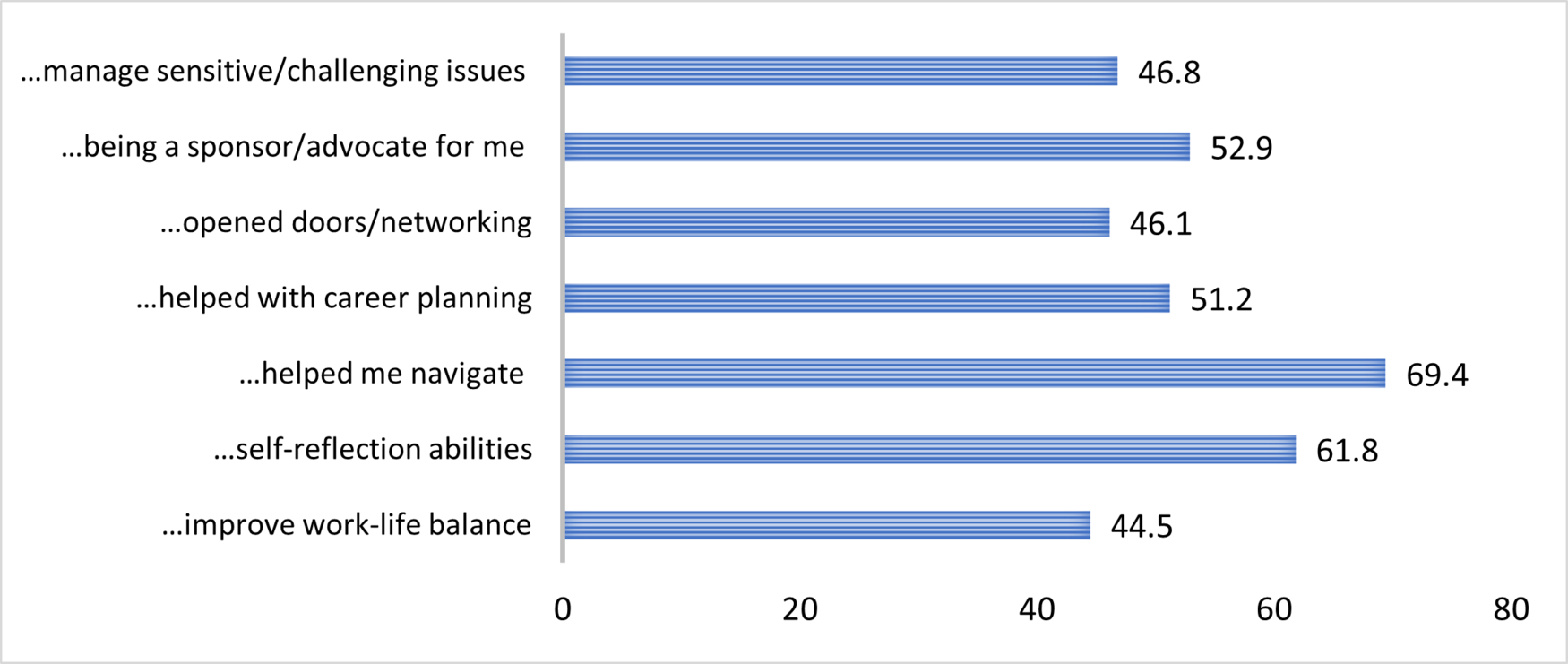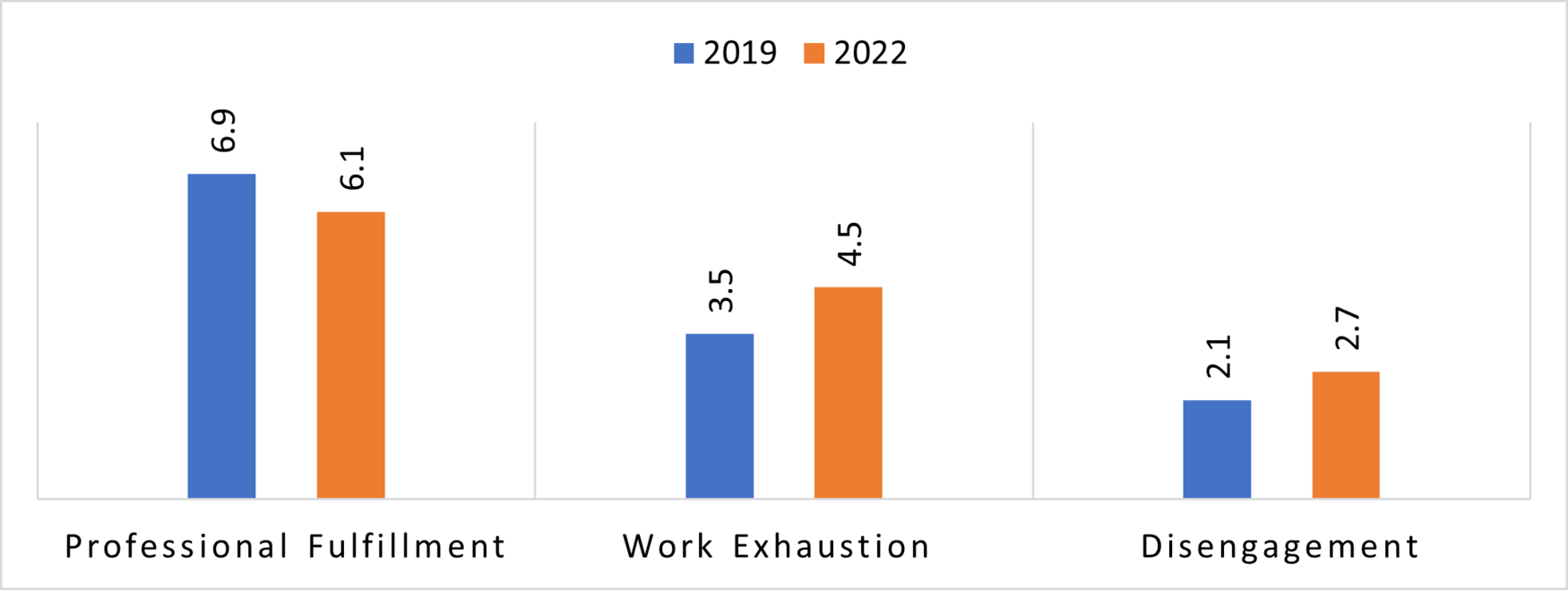Main Second Level Navigation
- Welcome
- Why Toronto?
- History of the Department
- Vision & Strategic Priorities
- Our Leadership
- Our Support Staff
- Location & Contact
- Departmental Committees
- Department of Medicine Prizes & Awards
- Department of Medicine Resident Awards
- Department of Medicine: Self-Study Report (2013 - 2018)
- Department of Medicine: Self-Study Report (2018 - 2023)
- Communication Resources
- News
- Events
Chair's Column: Results of the 2022 Faculty Survey
The wellbeing of our faculty and learners is a top priority for our department. Physician wellness and career fulfillment is essential for achieving high quality, person-centered care, for facilitating the successful education of the next generation of doctors, and to continue to excel in science and innovation. To take the temperature of our faculty members’ wellbeing, we have been conducting biennial faculty surveys since 2015.
Your responses on these surveys have directly shaped the department’s strategic priorities, policies and processes, resource allocation and divisional structure and support. They’ve informed not only what we do, but how we do it. For example, your input was the impetus for a new departmental portfolio focused on workplace culture, diversity, and inclusion and for the launch of initiatives geared towards enhanced recognition and promotion of our clinician teachers (lead for Valuing the Clinician Teacher & advocacy for promotion on the basis of Sustained Excellence in Teaching).
2021 was to have been our next check-in, but due to COVID, we postponed the survey twice. Last fall, we felt we could wait no longer to follow-up with you. Because we knew you were over-stretched, we kept the survey very brief, but left lots of opportunities for you to tell us more through optional free text comments. And I am happy to report that you did!
Of over 900 full time clinical faculty members, 540 of you or 59.5% responded. Thank you! This is our best ever response! Those of you who responded were highly representative of the department overall in terms of age, sex/gender, rank, academic position description, specialties, and hospital sites. 43.8% self-identified as from a group that is “under-represented in medicine”, URM, based on one of more of gender or sexual orientation (9.8%), race, religion, or ethnicity (19.8%), or other aspects, including age, language, immigration status, and family socioeconomic status (2.0%).
Academic Review & Career Development
Based on prior Faculty Survey findings, the department developed & disseminated a framework for Annual Academic Review (AAR) – the AAR Checklist - to help plan for and guide the discussion, implemented a mid-point, one-and-a-half-year check-in between recruitment and Continuing Faculty Appointment Review (CFAR), and appointed faculty leads for Mentorship and Late Career Transition in the Culture and Inclusion portfolio. In the 2022 Faculty Survey, we asked how we were doing.
Despite our efforts, only 41.8% of you reported having had an academic review in the past three years. This surprised us given the annual review process at each site and may reflect lack of clarity regarding what we meant by ‘academic review’. Regardless of the explanation, we need a better way to ensure that you have an opportunity each year to reflect on what is working and what is not, and why, beyond CFAR and Senior Promotion.
Mentorship
We were really happy to learn that 76.3% of you (78.3% female and 74.3% male faculty) have at least 1 mentor since this was true for only 47% of you in 2017. Overall satisfaction with mentorship has also improved; 74.3% of you indicated you were somewhat or very satisfied with your mentorship compared with 65.8% in 2017. We asked you in what ways your mentors had helped you. Your responses are shown in Figure 1.

Most of you noted that your mentor(s) had helped you navigate our university culture (69.4%) and improve your self-reflection abilities (61.8%). But fewer indicated their mentor(s) had helped with work-life balance, opening doors/sponsorship, or dealing with challenging issues. On further examination (in multivariable logistic regression analysis), satisfaction with mentorship was:
- 3X higher among early career faculty (first 5 years)
- 2X higher among those whose mentors had helped with career planning, self-reflection, and that had provided sponsorship.
- 1.5X higher among those whose mentors had helped navigate university culture
Controlling for these variables, none of specialty, rank, position description, sex/gender or race/ethnicity was associated with satisfaction with mentorship.
Career Satisfaction & Impact of COVID on your Academic Career
While 76% strongly or somewhat agreed with the statement “Overall, I am satisfied with my academic career”, this has declined from 85% in 2019. Consistent with this decline, 42% of you described COVID as having negatively impacted your academic career (42% overall; 49.4% female faculty and 36.8% male faculty). 41% felt there had been no real impact and a smaller group, 17%, described the career impact as somewhat or very positive.
Asked to elaborate regarding the pandemic’s career impact, over 300 of you responded. Some positives were noted by many: slowing down (closure) of some activities providing time for reflection; new opportunities for scholarship, e.g., COVID research, virtual care education, and new ways to teach; and enhanced focus on family, e.g. spending time with them. That said, many reported that personal obligations to family (elder parents and younger children) and enormous – and growing - clinical workloads had taken a heavy toll. For example:
“The pandemic was an extremely trying period, and now the workload is very high post-pandemic. We never really had a rest, and there is no mechanism to protect time for academic work. The educational demands are also increasing relentlessly. Trying to find time and energy to commit to my research in the face of this is impossible.”
We also heard a lot about the implementation of EPIC at UHN in the midst of repeated COVID waves!
As in 2019, we asked you to complete the Stanford Professional Fulfillment Questionnaire (ref), which assesses Professional Fulfillment, Work Exhaustion, and Interpersonal Disengagement. Figure 2 shows mean scores (/10) for each of the three subscales in 2019 and 2022. Higher scores are better for professional fulfillment, but worse for work exhaustion and disengagement. The bottom line? Professional fulfillment has declined, while work exhaustion and disengagement have increased.

Combing scores for work exhaustion and interpersonal disengagement, 54.8% met criteria for severe symptoms of burnout compared with 31.8% in 2019. Burnout was higher among female (58.3% versus 52.0% of male faculty) and earlier career faculty (59.8% of Lecturers/Assistant Professors vs 55.3% of Associate Professors and 45.8% of Professors). Burnout was also higher among those who indicated that COVID had negatively impacted their academic career (82.8% vs 52.3% if neutral and 37.1% if the impact was perceived as positive).
The relationship between faculty members’ age and burnout was different for male and female faculty. Among female faculty members, the proportion that met criteria for burnout was highest in those aged 51-60 years (73.1%) followed by those aged 41-50 years (66.0%). Among male faculty members, burnout was highest among the youngest faculty members (≤ 40 years, 67.9%) and declined with increasing age to 44.4% in those aged 71 or older.
Putting it all Together
The primary drivers of physician burnout are related to the health care environment, including high workloads, workflow inefficiencies, increased time spent in documentation, social isolation, and lack of leadership support. While academic leaders have relatively few levers to effect change in the health care environment, we can address physician-level factors that contribute to burnout, including but not limited to lack of mentorship, support and appreciation.
The 2022 Faculty Survey results suggest the following:
- While still high, since our last faculty survey in 2019, overall career satisfaction has declined and symptoms of severe burnout have increased. Career satisfaction is lower and symptoms of burnout higher among those who perceived the pandemic to have negatively impacted their academic career.
- Despite the pandemic, overall satisfaction with mentorship has continued to improve. This is good, since even after controlling for the career impact of the pandemic, greater satisfaction with mentorship is associated with higher career satisfaction and fewer symptoms of burnout.
Together, these findings support ongoing attention to how we mentor, sponsor and support our faculty members across the academic career lifespan. Once again, thank you for completing the survey – as I hope you know, your feedback is invaluable – it will guide DoM to guide our next steps. Our Culture and Inclusion team is already taking action as a result of your valuable insights – stay tuned for upcoming initiatves!
